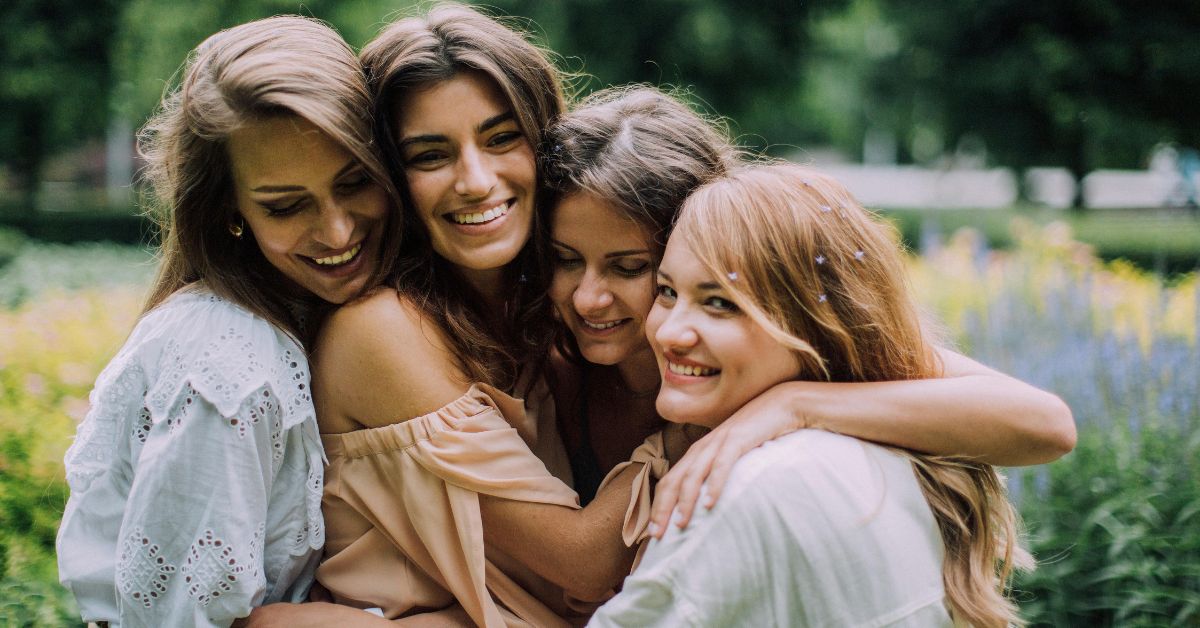Because good friends don’t just happen — they’re made, nurtured, and cared for.
Introduction:
Friendship is one of the most powerful human connections. And yet in an era of social media-marinated constant scrolling, digital distractions, and ever-so-frantic lives, many people find creating — much less sustaining — a deeply satisfying friendship can be a challenge.
You might ask yourself: How can I be a better friend to others — and to myself?
The good news? According to research, true friendship is based on skills we can learn and practice: empathy, consistency, openness, and emotional intelligence.
In this guide, we’ll look at over 25 actionable, science-backed ways to be a better friend — to your bestie or spouse, your long-distance pal, or even to yourself.
1. What makes a great friendship
The importance of friends. Friendships provoke, FameFood Month, Love and friendship, The wisdom of friends Infographic, afterEach
Good friendships aren’t left to luck — they are built by trust, empathy, and regular attention.
Psychologists sometimes refer to these as the “three pillars” of healthy relationships.
According to a 75-year Harvard Study of Adult Development, good friendships make us happier and healthier – even into old age.
Rather than try to be a better friend, you should first define “good friendship” and what it looks like for you — is it about loyalty, shared laughter, or deep conversation?
2. Be a Better Listener
Listening is one of the most undervalued superpowers of friendship.
It’s like people are all listening as if they’re going to answer, not like anyone is really listening to understand.
Try these small shifts:
- Look people in the eye. Recipients of positive attention spot fakers faster than you’d think.
- Don’t interrupt — let your friend complete his or her thoughts.
- Mirror it back: “That sounds incredibly difficult — how are you getting through it?
When your friends feel listened to, it’s like magic: Your connection just swells.

3. Show Up — Physically and Emotionally
Being a better friend isn’t about grand gestures — it’s about consistency.
Texting “How was your day?” or sending a meme can make someone feel remembered.
If you live far away, learn how to be a better long-distance friend:
- Schedule monthly video calls.
- Send voice notes instead of just messages.
- Celebrate milestones virtually (birthdays, promotions, or new pets!).
Being emotionally present sometimes matters more than being physically there.
4. Support Them During Hard Times
True friendship is tested during challenges.
If your friend is struggling with mental health, grief, or burnout, your presence is priceless.
Here’s how to be a better friend to someone with depression or anxiety:
- Don’t offer clichés like “Cheer up” — instead, listen and validate.
- Encourage professional help if needed.
- Be patient; recovery takes time.
Sometimes, “I’m here for you” means everything.
5. Be Open (Even When It’s Difficult)
Avoiding tough conversations weakens trust.
If something feels off, say it in a kind way:
“I value our friendship, but I’ve been feeling distant. Can we talk about it?”
Good correspondence keeps love and friendship honest.
Pro tip: This also applies to your romantic connections — being a better friend to your spouse or partner begins with empathy + openness.
6. How to Issue an Apology — and Forgive
We all mess up. Accountability is what separates good friends from great friends.
To be a better friend after fighting like cats and dogs, but come back stronger next time.
- Admit your mistake without excuses.
- Empathize (“I see how that hurt you”).
- Ask what you can do to rebuild trust.
Forgiving doesn’t mean forgetting — it means moving forward with understanding.
7. Respect Boundaries
Friendship doesn’t mean unlimited access. Healthy boundaries show emotional maturity.
Examples:
- Respect when someone needs space.
- Try not to step over the line into personal problems unless you’re asked.
- Don’t guilt-trip them if they can’t hang out.
This is part of what it means to be a better friend and person — appreciating each other’s uniqueness as well as your own.
8. Encourage Their Growth
A great friend celebrates others’ success — not competes with it.
Whether they’re learning a new skill, starting therapy, or chasing a dream — cheer them on. Each person values support differently. Some need verbal encouragement; others just need your quiet presence.
9. Check in Regularly
In busy adult life, months can pass without contact — don’t let that happen.
Send a text that says, “Thinking of you” or “Saw this and it reminded me of us.”
That’s how to be a better friend over text — quick, thoughtful check-ins that say, “You matter.”
10. Be Honest — But Kind
True friendship means you can tell the truth — gently.
If your friend is making a poor decision, express concern without judgment.
Tone matters more than words.
“I love you and I want to see you happy — I’m worried this might hurt you.”
That’s emotional honesty — the foundation of trust.
11. Take Care of Yourself First
You can’t pour from an empty cup.
To be a better friend to others, you must also learn how to be a better friend to yourself.
Set personal boundaries, rest when needed, and forgive yourself for mistakes.
When you’re balanced, you bring positive energy into your relationships.
12. Take a Lesson in Friendship from the Books
If you’re a fan of personal growth, friendship literature can inspire authentic improvement.
Here are some top-rated books:
- Big Friendship by Aminatou Sow and Ann Friedman
- The Art of Showing Up by Rachel Wilkerson Miller
- Friendship: The Evolution, Biology, and Extraordinary Power of Life’s Fundamental Bond by Lydia Denworth
- How to Be a Better Friend (Workbook for Adults)” by Maria H. Sanchez
These books can help you understand yourself and your friends more.
13. Reflect on Your Friendship Patterns
Ask yourself:
- Do I listen more than I talk?
- Am I there when it’s the wrong time?
- Do I give without expecting?
Self-examination is how to start being a better friend — it’s where the awareness and growth come from. Think about documenting your experiences or even turn to your friends for input:
“Is there anything I could do to be a better friend to you?
That question alone deepens trust.
14. Recognize When Friendship Feels One-Sided
It’s painful, but necessary.
If you’re always giving but never receiving, step back and evaluate.
Healthy friendships are mutual — both people invest emotionally.
You can care deeply without overextending yourself.
15. Celebrate Their Wins
Send that congratulatory text, show up at their event, or post a kind message online.
It’s easy to show sympathy during hard times — but celebrating joy builds deeper bonds.
That’s the secret of being a better long-term friend.
16. Keep Growing Together
Friendship evolves. People move, marry, change careers — and that’s okay.
What matters is staying curious about each other’s lives.
Keep learning, laughing, and building memories.
“Good friends grow old together, not apart.”
That’s what a lifelong connection looks like.
17. Bonus: Practice Acceptance
No friend is perfect — not even you.
Practice acceptance, grace, and forgiveness.
Sometimes, being a better friend means letting go of expectations.
18. Learn Your Friend’s Communication Style
Some friends need verbal reassurance, while others prefer actions. Observe what makes them feel supported and adapt your communication accordingly.
Science says: Empathy and “emotional attunement” are key traits of lasting friendships.
19. Respect Their Boundaries
A better friend knows when to step back. Respect personal space, privacy, and “no” — it builds trust instead of resentment.
20. Respect Their Boundaries
A better friend knows when to step back. Respect personal space, privacy, and “no” — it builds trust instead of resentment.
21. Support Their Growth — Not Just Their Struggles
True friendship isn’t only about being there when things go wrong; it’s also about cheering when things go right.
Science shows: Positive reinforcement deepens relational satisfaction more than shared negativity.
22. Be Honest — Even When It’s Hard
Kind honesty > blind agreement. Constructive feedback shows you care enough to help them grow.
Tip: Use “I feel…” instead of “You always…” to avoid sounding judgmental.
23. Don’t Compare or Compete
Friendship isn’t a scoreboard. Celebrate their wins without envy — it builds security and mutual respect.
Harvard research Indicates That Competitive comparison is one of the leading causes of adult friendship breakdown.
24. Include Them in Your Growth Journey
If you’re working on self-improvement, invite your friends along — share what you’re learning.
Example: “I’m trying to listen better — can you tell me if I interrupt sometimes?”
25. Stay Connected Across Life Stages
Friendship changes — people move, marry, or get busy. Instead of letting distance break the bond, find new ways to stay close.
Tip: Schedule monthly check-ins, share updates, or play online games together.
Conclusion
Being a better friend isn’t about perfection — it’s about presence, patience, and purpose.
Friendship, like any relationship, thrives when it’s nurtured.
Start small today:
Send that message.
Apologize when you’re wrong.
Show up when it matters most.
Because in the end, being a better friend isn’t about grand gestures — it’s about being there, consistently and wholeheartedly.




